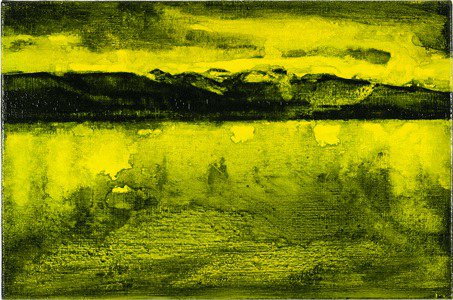Axel Kassebohmer
dal 21/11/2013 al 24/1/2014
Segnalato da
21/11/2013
Axel Kassebohmer
Spruth Magers, Berlin
100 x Walchensee. A series of one hundred small-format oil paintings based on motifs featuring the lake, some created near the summerhouse of Lovis Corinth, shown as a group.

Since the advent of modernism, the landscape, once among the most important genres of painting,
has been relegated to an art-historical twilight zone. The genre last enjoyed prominence with the
painters of Impressionism, among them Lovis Corinth. Corinth's most famous landscape paintings
come from the years before his death in 1925, when he spent his summers in the foothills of the
Bavarian Alps, along the shores of the lake known as the Walchensee. Axel Kasseböhmer takes up
this moment in art history in a series of one hundred small-format oil paintings based on motifs
featuring the lake, some created near the summerhouse of Lovis Corinth, shown as a group in an
exhibition entitled 100 x Walchensee.
Like many landscape painters before him, Kasseböhmer
pursued a private project with these pictures, creating the series after a long convalescence. The
paintings not only explore the status of the landscape in contemporary art, but also investigate what,
precisely, painting itself can achieve today.
Kasseböhmer's radical approach to painting is the result of a long development as an artist. The
painter earned a reputation at the beginning of the nineteen-eighties for his enigmatic paintings that
called to mind segments of well-known works from art history. Following this body of work,
Kasseböhmer created a series of pictures that used as their starting point large-format landscape
photographs, which he over painted until the underlying photograph disappeared. Afterwards he
developed various series', focusing on still lifes, trees and seascapes, taking up diverting styles to
conduct a systematic investigation into the possibilities of painting.
What connects all these series' is a
heightened awareness of loss. In his œuvre, Kasseböhmer undertakes the almost impossible
endeavor of ushering painterly values into today’s world.
The one hundred 'Walchensee' pictures, painted between 2010 and 2012, explore through various
means the possibilities of the pictorial space. Kasseböhmer makes uses of a range of styles or
methods from art history, and the artist’s handling of line and color is reminiscent of Corinth, Turner,
Matisse, or Munch. Yet Kasseböhmer also introduces many experimental techniques, making use of
combs, floor coverings, and other materials. This gives rise to a series of viewpoints that playfully add
a visual expression to the landscapes around the Walchensee, while also alluding to the history of
landscape painting and the classical notion of a spiritual landscape.
The serial nature of
Kasseböhmer’s enterprise allows him to explore all the materials, surfaces and moods unique to paint
and canvas, setting up countless interconnections between the pictures.
As a group, the 'Walchensee' pictures open up a dialectic between serialism and uniqueness, illusion
and abstraction. For example, the horizontal line is imbued with semantic significance on some of the
canvases, while on others it simply serves as an organizational principle for the composition, a means
of arranging various colored surfaces. Overall, Kasseböhmer's pictures of the Walchensee oscillate
between natural beauty and an aesthetic of destruction, between extreme, deliberate seriousness and
enduring humor with regard to the use of material. Whereas some of them are painted with
consummate mastery, others occasionally display their miscarriage, their failure. The pictures are at
once clearly obsolete and manifestly contemporary.
The prominent characteristic of the 'Walchensee' pictures is their stance of defiance. They take up a
self-confident position in opposition to the era of the media image, when a meager and dwindling
future is expected for the supposedly intractable medium of painting. Each oil painting of this series
enters into the world with a unique materiality and presence. Kasseböhmer's works step emphatically
into the presence of the viewer as painted images, a visual experience specific and unique to painting.
These are pictures marked by a profound conviction in the power of painting, including its traditions
and developments extending back over centuries. The paintings recognize in the pictorial space a
model for hope and a lifeline of sorts, deriving their vitality from the belief that painting can be far more
than the world as it is.
Axel Kasseböhmer, born in 1952, studied during the nineteen-seventies with Gerhard Richter at the
Kunstakademie in Düsseldorf, and has been connected with Sprüth Magers since 1984. Since 2001,
he is teaching at the Akademie der Künste in Munich. He has presented his works in solo exhibitions
at such institutions as the Westfälischer Kunstverein Münster (1989) and the Kunstverein München
(1990), and in group exhibitions at the Solomon R. Guggenheim Museum, New York (1989), the
Museum für Moderne Kunst, Frankfurt am Main (1991, 1998), the Museum of Fine Arts, Boston
(1994), the Hamburger Deichtorhallen (1995), and the City Gallery in Prague (2005).
At the same time, Sprüth Magers Berlin will present the solo exhibition 1970s Solid-Light Works by
Anthony McCall.
Exhibition Opening: 21.11.2013, 6 pm ‒ 9 pm
Spruth Marges Berlin-London
Oranienburger Straße, Berlin
Hours: Tues. – Sat., 11 am – 6pm
Admission: Free



